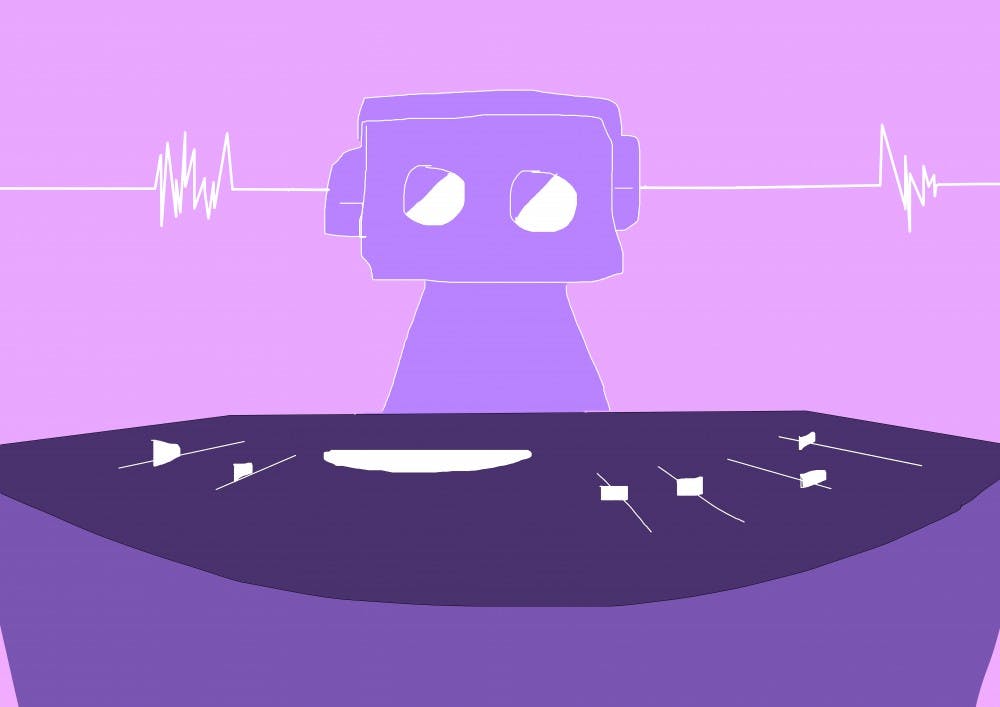When artificial intelligence comes to mind, we imagine an emotionally barren apocalypse: we're falling in love with lines of code that can't love us back, interacting with robots who speak and move in mechanical beats, and waiting for the day our computers decide to kill us. Humanity is gone, and perfection—in the form of machinery and numeric binaries—has arrived at the expense of human bonds. But for many in the music industry, AI offers an expansive playground to grow sound and listening experiences. It’s the new frontier, only instead of conquering humanity, musical AI serves to help it.
Take Warner Music Group’s latest venture. In obscure music news, the label responsible for performers like Charli XCX and Gucci Mane—artists that specialize in bangers loaded with freedom and individuality—signed an algorithm to a 20 album–a–year record and distribution deal. In other words, a computer could soon be responsible for the songs that soundtrack your life.
As a matter of fact, that’s what this algorithm intends to do. Produced by Endel, a tech startup with a musical focus, the software uses AI to create personal tracks to boost your mood when it needs it most -- in the midst of a traffic jam, after a Math 104 exam, before one those intense mid–semester all nighters. Oleg Stravinsky, the software brand’s co–founder, envisions a future where Endel can track "the rhythm of user’s daily lives” via metrics like daily schedules and driving pattern to produce songs and playlists to keep users productive and sane when life is anything but.
In short, the point of their AI is personalization, which sits at the core of music–making, robotic or human. The mark of a good song is that it feels personal, even if it frequents Top 40 radio or that cyclical party playlist rotation. Our favorite songs are the ones that shake our cores and remind us of a time when we were happier, or sadder, or different than we are now. Endel hopes to do that on a more technical level, using inputs to generate songs guaranteed to resonate. This record deal may undercut Endel’s true purpose, but serves a more important one—to naturalize AI into the music industry.
These albums, and the five already released, come in themed suites. Sleep: Cloudy Night is full of ambient, wistful sounds that whisper of lullabies. Sleep: Rainy Night does the same, but with rain. On a focused level, these albums should replace counting sheep and lull listeners towards REM. But as they normalize consistent sleep patterns and the notions that robots are, in fact, talented, they also prototype the future of the music industry, where the line between human and program blurs.
Endel isn’t the only AI start–up infiltrating our playlists. Techstar Music, a division of a larger start–up incubator, uses AI to merge venture capital with the arts. This pair of opposites actually converges more than we think. Music distracts us from our problems. Hearing a banger before a final gives us the power to forget the possibility of failure, whatever that means, and a ballad can uplift us from the most personal doldrums.
Meanwhile, venture capital aims to solve problems, empowering apps like DropBox that streamline our lives with Marie Kondo precision. Techstar wants to “invest in companies solving problems” for music. These companies aim not to remove humanity completely, sanitizing music of authentic emotion, but make songwriting and producing easier and more accessible, making authentic emotion easier to reach.
Amper, for example, allows influencers and content creators to compose royalty free background music with AI. With Amper, no vlog goes soundless, allowing YouTubers to create the content their followers want—personal and detailed, transporting viewers to trips down Mailbu’s coast or a weekend in London. Meanwhile, Popgun uses streaming service data and AI to help writers target their lyrics toward consumers. Often times, we conceive of the songwriter as introverted, with their head buried deep in moleskin full of songs that, while cathartic, don't mean much to anyone else. AI-influenced programs like Popgun demystify the songwriter, patterning a new stereotype where writing is an audience-driven process.
AI on its own is impersonal, disconnected from a reality in which feelings fluctuate, tastes change, and humans live free from a set code. But tempered with music, AI can pantomime feeling, bolstering the interpersonal connections that only songs can make.

